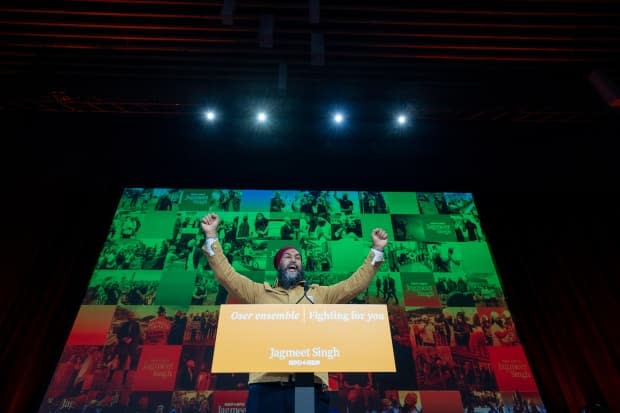NDP projected to make minor gains in Jagmeet Singh's 2nd election as party leader
The NDP is poised to make an incremental gain in seats but will remain the fourth-place party under the projected Liberal minority government.
New Democrats are currently now elected or leading in 25 ridings.
A total of 25 seats would only barely surpass the 24 seats the NDP won in the 2019 election.
The party did slightly increase its share of the popular vote at 17.7 per cent so far, an improvement of 1.7 per cent over its 2019 result.
"I want you to know our fight for you will continue," Singh said in a late night speech in Vancouver.
He won his nearby riding of Burnaby South.
"You can be sure that we will be there for you, and you can also be sure that if we work together we can build a better society, and that's exactly what New Democrats will do."
WATCH | Singh delivers election night speech:
The Bloc Québecois held off the NDP to retain third place in the next Parliament, though both parties can provide enough votes to the governing Liberals to pass legislation.
Blake Desjarlais defeated the Conservative incumbent Kerry Diotte in the riding of Edmonton Griesbach, which the party had identified as a prime target. That victory there doubles the NDP's seat count in Alberta from one to two; Heather McPherson was re-elected in nearby Edmonton Strathcona.
The NDP is also leading or projected to win in 13 ridings in British Columbia, an improvement of two compared to 2019.
But the party had a disappointing night in Quebec, where they are not currently projected to pick up any new seats. Alexandre Boulerice is projected to hold his seat in the Montreal riding of Rosemont–La-Petite-Patrie, which will make him the NDP's sole Quebec MP for the second consecutive election.
Former MP Ruth Ellen Brosseau was considered the party's best hope of picking up a new seat in Quebec, but she was narrowly defeated by the Bloc incumbent in Berthier-Maskinongé.
The party will also fall well short of the 44 seats it won in the 2015 election. The NDP captured 103 seats and formed the Official Opposition during its "orange wave" of 2011.
A similar campaign, with slightly better results
The NDP campaign largely resembled its pitch to voters from the 2019 election, Singh's first as the party leader.
The $200 billion platform's signature promises included higher taxes on corporations and people the NDP calls the "ultra-rich;" as well as new national pharmacare and dental care programs.
The NDP has also proposed more ambitious emission reduction targets than the victorious Liberals, though the NDP plan has been criticized for lacking in detail.
Singh had said throughout the campaign that the inequities exposed by the pandemic made Canadians more amenable to his policy ideas.

"In this pandemic, people got more help because we were there, we were able to increase the supports to people," Singh said last week. "If people want more help, more New Democrats will make it happen,"
Senior party officials said they were also confident that voters would gravitate to Singh, who they said would benefit from an added two years of exposure since his first election as leader.
The CBC's Vote Compass found Singh rated highest among all party leaders in competence and trustworthiness, though many people who scored Singh highly in those categories said they did not plan to vote for the NDP.
What role will NDP have in next minority government?
Singh refused during the campaign to speculate about his party's role in a possible minority government, saying that he did not want to concede the election before votes were counted.
He was sharply critical of both the Conservatives and Liberals during the campaign.
Just last week he said that Justin Trudeau has been an "abject failure" as prime minister, and that both Trudeau and Erin O'Toole would be "bad for Canada."
However, with as few as 26 seats, the NDP will hold a strong bargaining position to push the Liberals on some of the big-ticket policies it proposed during this election.
As a minority government, the Liberals will need to lean on other parties to pass legislation, though either the Bloc or NDP could provide enough votes to pass Trudeau's signature promises such as a new national childcare program.

